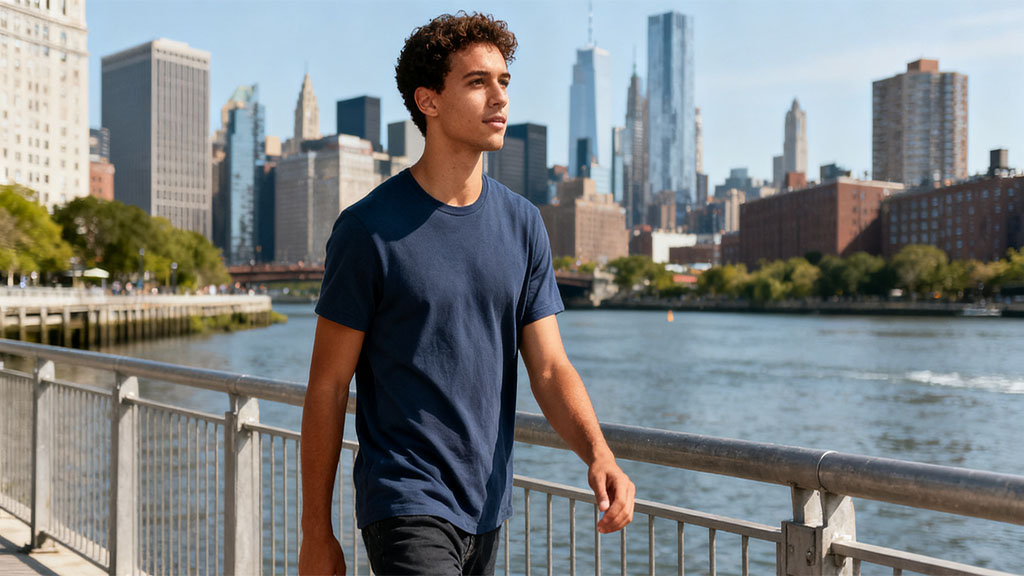It’s strange how a single night can loop in your head for years, like a song you never learned the words to but somehow can’t forget the tune.
For me, that night was a random Thursday in Chicago, two years ago.
I’d just left work late, drained and running on the kind of caffeine that doesn’t even help anymore. The city was buzzing, humid air pressing against the glass towers, lights from the river throwing gold streaks on everything. I wasn’t supposed to be there. I was supposed to be halfway home by then.
But the train line broke down. Typical. So I decided to walk to the next station, headphones in, mind half somewhere else. That’s when I saw her.
She was sitting on the edge of the bridge, legs crossed, talking to herself—or maybe to her phone’s camera, I couldn’t tell. The light from the passing cars flashed across her face every few seconds, and she’d look up each time, like she was waiting for something, or someone. There was this calmness around her, but not the peaceful kind—more like someone trying hard to seem okay.
I don’t even know why I stopped. Maybe it was how out of place she looked, sitting there in that chaos. Maybe it was the way her hair kept catching the wind. I said something stupid, like “You’re gonna drop your phone like that,” and she laughed. A real laugh—not polite, not forced. Just real.
We started talking. About random things—how the trains here never work, how the city feels both alive and lonely at the same time. She told me her name was Hailey. She was a photographer, trying to put together a series about the people who live by the river. Said she liked capturing “in-between moments.” I didn’t know what that meant then, but I do now.
She asked me if I wanted to walk with her. I said yes.
We walked for an hour. Maybe two. Past the dark water, the empty benches, the noise fading behind us. It wasn’t romantic, not in the way movies make it. It was quiet, familiar in a way that made no sense. Two strangers, walking nowhere, sharing stories that didn’t really matter. She told me she hated small talk, and I told her I was terrible at everything else.
When we reached the next station, the trains were running again. I asked for her number. She smiled, shook her head, and said, “Some things are better left as just a moment.”
I laughed, thought she was joking. She wasn’t.
She said, “If we’re supposed to meet again, we will. Chicago’s smaller than it feels.”
And that was it. She got on the train. I stood there like an idiot, trying to memorize her face through the window.
I saw her again three months later—well, kind of. I was scrolling through an online photography feature about emerging local artists. Her name was there. So was her face. The headline read “Capturing the City’s Quiet: Hailey P.”
The photos were all of people caught between motion—someone crossing the street mid-step, a woman closing her umbrella in the wind, a man leaning over the railing of the same bridge where we’d met. Every picture looked like it was holding its breath. And in the middle of the set, there was one that stopped me cold.
It was me. Standing on that bridge, head turned slightly, city lights blurring behind me. I didn’t even realize she’d taken it. The caption read: “He didn’t know he was part of the story.”
I don’t think I breathed for a minute. I wanted to message her, but I didn’t. Maybe I was scared it would ruin whatever that night had meant. Or maybe I thought she was right—some things are just moments.
I’ve passed that bridge a hundred times since. Sometimes I stop, just for a minute. The city’s changed—new restaurants, new lights, people always rushing somewhere—but that spot still feels the same. Every once in a while, I catch myself scanning the faces, half-hoping she’ll be there again, camera in hand, pretending not to wait for anyone.
But she never is.
Last month, I heard she moved to Seattle. A friend of a friend mentioned it casually at a party. I nodded like it didn’t matter, but it did. It still does. Because for all the noise, all the people, all the years that have passed, I still think about that night. About how everything could’ve been different if I’d just said, “Let’s meet again,” instead of waiting for fate to do the work.
I guess that’s the thing about missed opportunities. You never really know if they were supposed to be yours or not.
Maybe that’s why her photos hit so hard—they weren’t about what she captured, but what she didn’t.
And sometimes, when I’m walking home late and the river lights ripple the same way they did that night, I catch my reflection in the glass, and for a second, I almost believe she’s still looking for those in-between moments.
Maybe I still am too.
 lockingeyes
lockingeyes 